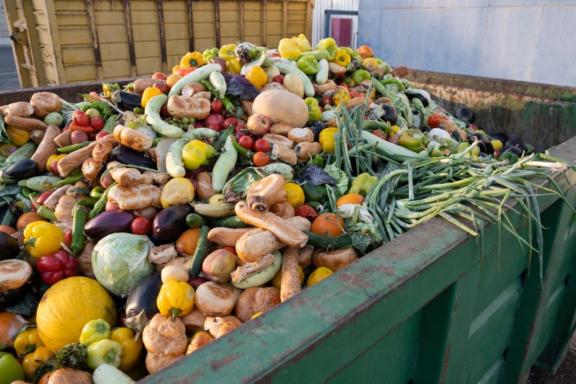Household food waste
Be climate positive, reduce food waste
When food is wasted, all the resources used in bringing food to our tables are wasted too. Reducing your food waste is a key action you can take to help the environment and save money too.
Food waste is a significant contributor to climate change, generating around 10% of global greenhouse gas emissions. Throwing out food is a waste of money.
The average Irish household can save around €700 a year by avoiding food waste.
New legislation, which came into effect in January 2024, means all householders in Ireland are entitled to a brown (compost) bin recycling collection service from their waste collector. For more information, contact the Environment Section.

Tips on how to avoid food waste
- take stock of what you already have.
- make a meal plan
- make a shopping list
- shop smart and buy local
For more information and to find tips and meal planning recipes, check out Stop food waste.
Tip: Using a small brown bin caddie can help reduce mess and keep your larger outdoor brown bin clean. Download our guide: How Best to Use Your Kitchen Caddy.
Waste minimisation tips
Reduce, Reuse, Recycle
- Waste minimisation is a key component of reducing your carbon footprint and living sustainably. Here are some tips to help you minimize waste at home:
- Reduce: Buy only what you need and choose products with minimal packaging.
- Reuse: Opt for reusable items such as cloth bags, water bottles, and containers instead of single-use plastics.
- Recycle: Separate your waste and ensure recyclables are clean and sorted correctly.
- Repair: Fix items instead of discarding them; many things can be mended or repurposed.
- Donate: Give away items you no longer need to charities or community groups.
Reuse and recycling are at the heart of the Circular Economy, the European strategy aims to maintain products, materials, and resources for as long as possible, and to minimize overall waste. It is an opportunity to do more with less, better use available resources, and reduce waste in the first place!
At home composting
Composting is simple, natural, fun, and it can save you money!
Compost can happen anywhere in nature and is happening every day. Organic material such as leaves, grass, and vegetable scraps are broken down by naturally occurring soil organisms to form a humus-rich compost.
For the composting process to take place, you need air, moisture, organisms, GREEN materials, and BROWN materials, all of which Mother Nature provides us with.
- Green materials = fresh, soft, moist materials such as grass and food scraps.
- Brown materials = dry, hard materials such as leaves and woody materials.
Composting is the single most effective way we can help the environment and put back in the earth what we take out.
